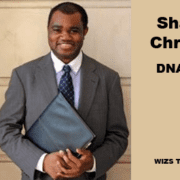TownTalk 2-4-21: Genealogy & History With Shannon Christmas and Mark Pace
The way Shannon Christmas sees it, the reason genealogists should use new-fangled science in conjunction with old-fangled documentary research to complete their family tree is simple: DNA does not lie, he said. Sometimes, people do.
Christmas spoke with Bill Harris and Mark Pace on Thursday’s Town Talk about how genetic testing can confirm family histories that often are passed down through man-made documents. But DNA can also throw genealogists a curve ball, he said, when test results don’t match up to what family members have known, or been told, for years.
The noted genetic genealogist paid a return visit to Town Talk and encouraged all levels of genealogists to really understand the value of both science and old-fashioned research to have as complete a family tree as possible. “We have a real problem now,” Christmas said, that individuals think that “all they need to do to learn about their family history is just to take a DNA test and nothing else.” DNA test results can yield information about previously-unknown branches of a family tree, but documentary research – combing through court records or family papers, for example – “can provide the same sort of shocking info, the same sort of revelation,” Christmas said. It is important, he added, to do both of them together when working to fill in the family tree.
Click Play for this edition of TownTalk…
A DNA test is “a great resource for confirming one’s own ancestry and also for extending your family tree,” he said. Knowing the different types of tests and their particular strength is helpful, too, he added. Autosomal DNA testing and X-chromosome DNA testing are used to predict relationships and assign kinship, he said. Sometimes, a family tree’s branches are gnarly, such as when families have double-first cousins or half siblings. That’s when genealogical DNA tests can help. The Y DNA is passed from father to son, and mitochondrial DNA, which males and females both have, is only passed down from mothers.
Christmas decided to delve into his own ancestral lineage when his nephews were born.
“In 2009, I recognized that my position within my family had changed. I was no longer the oldest member of the youngest generation,” he explained. “I became an uncle and I wanted to document my family’s history for the next generation – For my nephews – and their children. “ Although that was his prime motivation, he confessed: “I also enjoy the intellectual stimulation that comes from doing genealogy and genetic genealogy in particular.”
Here’s just a snippet of what he’s learned about Erasmus Christmas, his paternal 2x great-grandfather: He was born enslaved in 1830 in Warren County. Through the family’s oral history, he had been told that his biological father was also the slave owner and his mother was an enslaved woman on the plantation. “DNA was able to provide evidence that supported the oral history,” Christmas said. Y-DNA test results showed that he, indeed, had traits that were of European origin. “That was a crucial piece of information that confirmed the oral history; in addition, the autosomal DNA matched me to other descendants of the slave owner’s parents.
He predicts the future of DNA testing will come to include complete genomic mapping, which, in addition to artificial intelligence and automation, can help speed up the whole process. More cataloging of more DNA segments is one thing, Christmas said, but “artificial intelligence is, well artificial.” No algorithm in the world can take the place of the human eye when it comes to noticing errors, he said. Genealogists must continue to do research manually and continue “to vet every source and every record” for accuracy.
For now, Christmas said, “it’s more important to get your DNA into each of the autosomal DNA databases. There might be a relative in one database and not in the others, and those relatives might have the answers you’re looking for.”
Take the case of King Richard III, for example. The British monarch’s remains were positively identified in 2013 using DNA from living descendants. The king died in 1485. That’s 528 years, folks.

